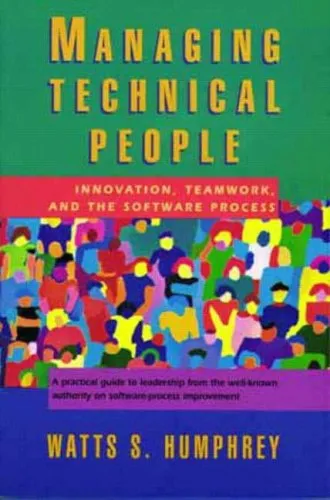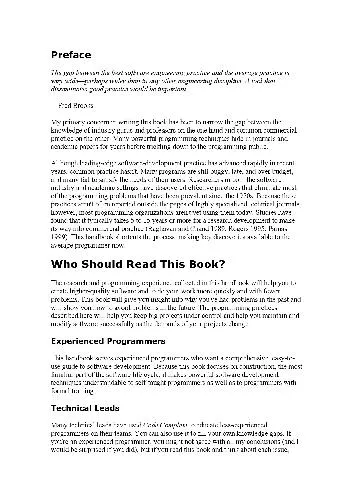Managing Technical People: Innovation, Teamwork, and the Software Process
4.5
Reviews from our users

You Can Ask your questions from this book's AI after Login
Each download or ask from book AI costs 2 points. To earn more free points, please visit the Points Guide Page and complete some valuable actions.Related Refrences:
Introduction to "Managing Technical People: Innovation, Teamwork, and the Software Process"
"Managing Technical People: Innovation, Teamwork, and the Software Process" by Watts S. Humphrey is a thought-provoking and insightful exploration of what it takes to lead and inspire technical teams. This book is a cornerstone for technical managers, team leaders, and organizational strategists, offering powerful advice on how to nurture innovation, foster collaboration, and achieve operational excellence in the context of the ever-evolving software engineering landscape. As a prominent figure in software process improvement, Humphrey presents a treasure trove of knowledge aimed at equipping leaders with the tools to effectively manage and motivate their most critical resource: people.
With decades of experience, the author delves into the nuances behind technical workforces, seeking to resolve the unique challenges of managing individuals who often prioritize logic, creativity, and independence. Shockingly, many organizations struggle to build supportive environments that encourage technical professionals to thrive—not through rigid oversight, but through meaningful collaboration, process alignment, and goal-oriented motivation. This book explores these themes by breaking down essential practices into actionable advice that blends process techniques with interpersonal skills.
The book is essential reading for professionals navigating the complexities of software-driven industries. Whether you are an experienced manager or new to leadership roles, "Managing Technical People" equips you with a comprehensive framework to bring out your team’s best, helping them create innovative solutions while building trust and harmony.
Detailed Summary of the Book
The essence of this book lies in aligning technical excellence with effective leadership. Humphrey begins by framing the unique challenges of managing technical professionals, emphasizing their distinct thought processes and work habits. These individuals thrive on creativity, problem-solving, and autonomy, which entail entirely different management methods compared to non-technical teams. Early chapters identify why traditional management methods often fail in technical environments: overly rigid structures, poor communication, and misaligned performance incentives can stifle the very innovation technical teams are tasked with delivering.
Humphrey then shifts his focus to the importance of process. The book goes beyond simply advocating for rigorous software processes and instead demonstrates the synergy between process improvement and human ingenuity. Key frameworks discussed include personal software process (PSP) and team software process (TSP), which are crucial for achieving both individual and group productivity while maintaining high-quality deliverables.
Later sections dive into fostering teamwork among technical professionals, addressing common conflicts, misunderstandings, and morale issues. Humphrey equips readers with strategies for restoring trust and aligning individual goals with organizational objectives. The book also highlights the pivotal role of leadership in sparking innovation and sustaining motivation over the long term. While Humphrey provides actionable recommendations, he never loses sight of the human element, ensuring his advice remains grounded in empathy and respect for technical professionals' expertise.
Key Takeaways
- Technical professionals require autonomy, creativity, and meaningful challenges to thrive.
- Traditional command-and-control management styles are ineffective in technical environments.
- Introducing robust processes, like PSP and TSP, enhances productivity and reduces errors without stifling creativity.
- Trust and open communication are the cornerstones of successful technical teams.
- The role of a manager extends far beyond task delegation—it involves inspiring, mentoring, and creating opportunities for innovation.
Famous Quotes from the Book
"You can't manage technical people the same way you manage other employees. Their skills, motivations, and challenges demand a tailored approach."
"Trust is built over time, but it can be destroyed in an instant. As a leader, protecting the trust of your technical team is your greatest responsibility."
"Innovation is not a byproduct of control; it is the natural result of an environment where creativity is encouraged and valued."
Why This Book Matters
"Managing Technical People" is a landmark publication because it bridges the gap between management theory and technical practice, addressing a topic often overlooked in leadership literature. Technical professionals are the backbone of today’s technology-driven economy, responsible for breakthroughs that transform industries and society at large. Yet, many organizations fail to realize the competitive advantage that comes with effectively managing this talent pool.
Watts S. Humphrey’s book is vital for leaders who want to create environments where innovation flourishes and teams can reach their full potential. It underscores the importance of process, not as a constraint, but as a tool for unlocking creativity and sustainable success. By contextualizing human factors alongside technology, the book provides a holistic approach to leadership in technical domains.
In an era where software development plays a critical role in business expansion and product innovation, "Managing Technical People" acts as a guiding light for those seeking to balance the technical and interpersonal dimensions of leadership.
Free Direct Download
You Can Download this book after Login
Accessing books through legal platforms and public libraries not only supports the rights of authors and publishers but also contributes to the sustainability of reading culture. Before downloading, please take a moment to consider these options.
Find this book on other platforms:
WorldCat helps you find books in libraries worldwide.
See ratings, reviews, and discussions on Goodreads.
Find and buy rare or used books on AbeBooks.
1486
بازدید4.5
امتیاز0
نظر98%
رضایتReviews:
4.5
Based on 0 users review
Questions & Answers
Ask questions about this book or help others by answering
No questions yet. Be the first to ask!














